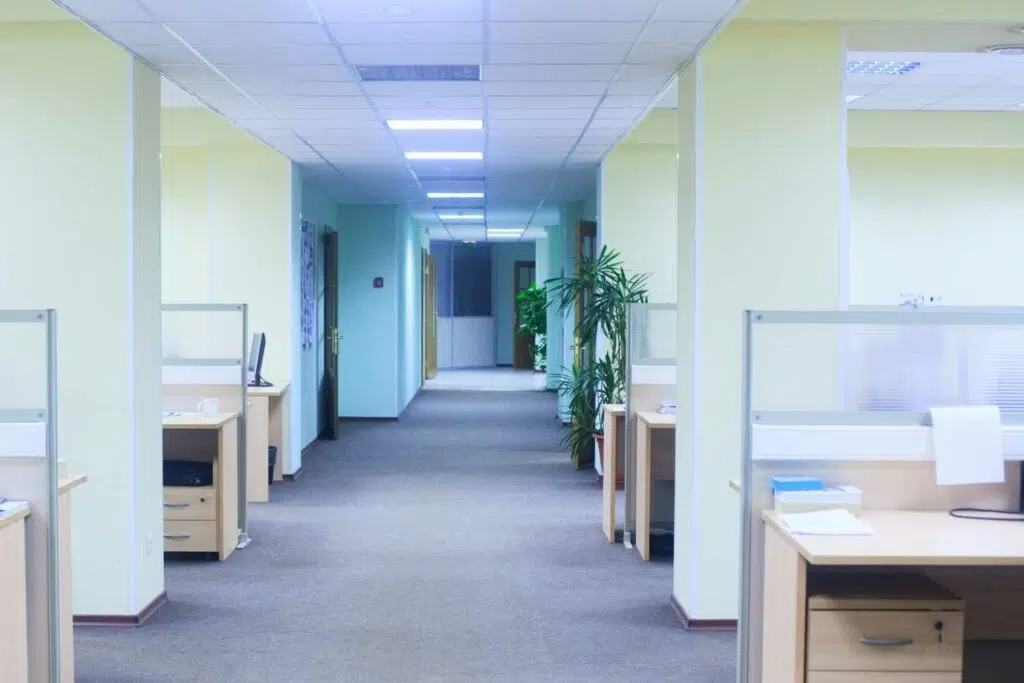
Revolutionising Energy Management in UK Businesses
In an era where sustainability is not just a buzzword but a business imperative, UK companies are increasingly turning to innovative solutions to manage their
The workplace has always been relatively structured concerning how and where employees work. It was standard practice for companies to expect employees to be based in the office permanently unless some additional agreement was put in place. Employees understood these expectations which is why working from the office permanently has never been an issue. However, in recent years, things have changed beyond anything we ever expected and that was all down to the Covid-19 pandemic.

When the pandemic arrived in March 2020, the entire world was turned on its head. Everything that we recognised as part of everyday life was almost removed, which also included how we worked.
Companies told staff to work from home and this is where they remained for the best part of a year and beyond. Covid-19 restrictions were gradually eased during the first year of the pandemic but, even during the second year of the pandemic, many of the restrictions remained in place. This meant that staff were still not expected to return to the office.
But in 2022, as the final restrictions were removed and the UK started to get back to some sort of normality, some staff were asked to return to the office. This was not embraced by employees who had experienced the benefits of working from home for two years. In recognition of “Happiness Happens Month”, at Envelo we want to explore where and how happiness happens in the workplace.
For many, going to the office every day was something they did because they had to. It formed part of their employment contract and so, they didn’t even give it a second thought.
In some instances, employers made it clear that staff would not be productive working elsewhere or they would be unable to do their jobs. For some during the pandemic, this idea was proven to be wrong.
When working from home or any other location, all they required was an internet connection and a laptop and they had the scope to carry out much of what they did in the office from elsewhere.

The transition was almost seamless for many, except for small IT teething problems such as setting up online systems and VPNs so staff could access work files and systems from remote locations safely and securely.
However, there was much more than just the comfort of working from home that the staff embraced.
The daily commute was something that many people just accepted. Some would spend hours travelling to and from the office because that’s what they had to do. The pandemic enabled them to remove this from their lives. People had more time for their families and selves and saved money by not having to commute.
For some, the pandemic arrived as a blessing in disguise, especially for employees from a work perspective. It was as though how people worked had been brought forward by ten years but with COVID-19 restrictions removed.
Some employers made it clear that staff had to come back into the office, and this was met in many places with resistance.
So, how could companies be creating a crisis by not considering alternatives for how and where employees work?
Morale has always been a big driver behind success in the workplace. Before COVID-19, it was vital that employers did everything possible to increase morale and there were many ways in which they could do this. It could range from reward schemes to extra days off, free food and drinks, team-building activities, and other incentives. It all helped to boost morale because it was all employees could access to make them feel better.
The issue with employers not allowing employees to work ‘how and where they want’ is that it may impact morale. It may leave employees feeling as though they are not trusted and that their employer is not willing to evolve and recognise any positive impact that working elsewhere can have on their well-being. In places where productivity and well-being were assessed and measured before the pandemic, this might not be so. Decisions should be made to bring people back to the office, or WFH, by facts and data, not by assumption.
However, where employers just want people back to the office, (not knowing whether their employees were more, or less productive at home), leaves the floor open for debate!
The latter, without data-driven decisions being made can lead to a morale crisis. This could be where people will feel as though they no longer want to go above and beyond for their employer and that could ultimately cause companies to suffer in many ways.

Throughout the pandemic, mental health and well-being awareness was placed in the spotlight. This was down to the fact that we had a lot to deal with in such a short space of time. From having to change our ways to being told to stay at home and not seeing friends and family, it affected some people deeply and resulted in a rise in mental health and well-being issues.
Working remotely gave people the opportunity to reassess their situation and find a work-life balance that enabled them to get more from life. They no longer had to spend time commuting to work, travelling to various meetings, or putting up with the stressful work environment. The reality is that the workplace contributes to stress, as does the commute and many other elements of working on location, especially where well-being and the workplace environment is not being monitored, measured, and kept healthy.
Well-being and mental health are vital to success in the workplace and people have become more attuned to working remotely for a fairly long time. Expecting them to revert to previous arrangements could leave them struggling.
In recent years, attracting and retaining top talent has become vital for businesses to remain competitive. The modern workforce has certain expectations when it comes to their employer, and people focus on the ethos of the company, and how they feel valued and trusted. These are extremely important when it comes to ensuring that companies retain employees because they will quickly move jobs if they feel as though they are not being treated right.
This is a potential crisis that employers could face should they not allow employees to work how and where they want. The ability to work remotely allows employees to work in a way that delivers satisfaction but also creates a feeling of trust and value. There is more to a job than just the salary because employees want employers to show that they value their input and the impact they have on the success of a business.
Furthermore, existing employees might inform others about the approach that their employer is taking. This could mean that top talent no longer considers these companies to be desirable employers.
Studies show that remote work is correlated with a decrease in physical and mental stress. However, what research does show is that a mixture of both WFH and the office, (so a hybrid role) is the best way forwards.
Previously, fully remote work was associated with a worsening in performance. A hybrid model allows employees to work on certain days from home and other days at the office. Research suggests this to be a more favourable setup.
Many factors contribute to the improvement or reduction in productivity from home, ie is the work environment quiet? Does it allow you to focus? Do you have sufficient internet and technology capabilities?
Remote work does encourage autonomy and higher performance, but if an employee (who previously worked on location) is ill, where they may have taken the day off sick previously, what we are finding is that people may continue to work remotely, but at a much less efficient manner. Some are then going on to suffer from burnout and are having to take longer, extended periods off.
Personality is a major contributing factor to productivity during remote work too. Those who are more towards the introverted side may find working remotely bliss! Whilst those who are extroverted and take energy from being around people may struggle to thrive when working from home.
So, the ideal scenario to gain that freedom, flexibility, and life balance is the hybrid role, which offers a bit of both for all.

It’s important to know too, that being in the office does have its positives.
We have already covered how COVID-19 has turned the world on its head and that includes the workplace. While many people quickly became accustomed to working in the office, there were still plenty of people who missed the office environment. There is a reason why office-based work has been popular for so many decades. We still believe that this is very much the case and many people were more than happy to return to the office or wanted to return as soon as possible.
The reality is that there are many benefits to working in the office.
One of the most important aspects of working in the office was the social element because interacting with colleagues is an important part of that. This can help to drive creativity, happiness, and a feeling of recognition. Something that you don’t necessarily get when working remotely and alone.
It’s not just workplace conversations that are important to happiness, as gossip and general chat can lift morale and positivity. Workplace culture has a huge influence on our well-being. When the workplace is clean and healthy and we have the opportunity to interact with others, it has a positive impact on our happiness. While working in a virtual environment can work for many, social interaction and having the scope to improve and learn within a work environment are two very important reasons behind workplace satisfaction and happiness.

In an era where sustainability is not just a buzzword but a business imperative, UK companies are increasingly turning to innovative solutions to manage their

In the dynamic world of work, it is crucial to adapt to emerging trends that shape the future of our workplaces. As we approach 2023,

Embracing Innovation with Envelo for Sustainable Business Operations In today’s business landscape, there has been a remarkable shift in the way organisations approach energy consumption.
Complete our survey below to see how your business performs.
Wanting to improve your workplace health and well-being, whilst reducing workplace sickness and improving productivity? Book a demonstration with one of our team today, and see how Envelo can monitor, manage and improve your workplace environment.
Envelo protects people from viruses and pollution and helps improve their wellbeing using prevention methods and app-driven monitoring technology.

Envelo Solutions Ltd (Company Number: 13100630)
Complete the form below to see Envelo’s smart technology platform in action. We’ll get back to you within 24 hours to schedule the best date and time to suit you.